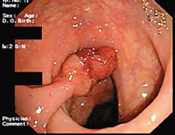Improving Colorectal Cancer Screening in African Americans
Exposure to a preference-based mail and telephone navigation intervention increased colorectal cancer (CRC) screening adherence compared to a standard mailed intervention among African Americans.
Current CRC screening levels lag well behind screening tests for other cancers

Exposure to a preference-based mail and telephone navigation intervention increased colorectal cancer (CRC) screening adherence compared to a standard mailed intervention among African Americans, according to the results of a study (abstract 1501) presented at the 2014 American Society of Clinical Oncology (ASCO) Annual Meeting, held May 30–June 3 in Chicago.
“This trial is the first of its kind testing the impact of preference-based tailored navigation on colorectal cancer screening adherence among a solely African American population,” said Praveen Ramakrishnan Geethakumari, MD, of the Albert Einstein Healthcare Network in Philadelphia.
Current CRC screening levels lag well behind those of other screening tests for other cancers, and there exists a substantial white/African American disparity for screening of CRC, with the African American screening adherence substantially lower.
According to Geethakumari, tailored preference-based navigation intervention may help patients to complete their preferred CRC screening test.
The study was conducted between 2008 and 2012 at 13 primary care practice sites in the Philadelphia area. Participants were African American men and women aged 50 to 75 years who had visited a primary care practice in the past 2 years but were non-adherent to CRC screening guidelines. Participants could not have a personal or family history of CRC.
A baseline telephone survey was administered to 764 patients before they were randomly assigned to a standard intervention group (n = 380) or a tailored navigation intervention group (n = 384). The standard intervention group received a mailed CRC education booklet, colonoscopy instructions, and a stool blood testing kit, followed by a mailed reminder at 45 days. In the tailored navigation intervention group, patients were mailed a CRC education booklet, followed by a mailing of screening contacts and a navigation call that helped determine screening preferences, as well as a mailed reminder at 45 days.
The primary endpoint was CRC screening adherence at 6 months.
At baseline, 18% of patients preferred stool blood testing, 57% had no preference between the two options, and 25% preferred colonoscopy. These numbers were similar between the two groups.
At the end of 6 months, there was a substantial increase in screening adherence in the tailored navigation intervention group compared with the standard intervention group (38% vs 24%; P = .029). Screening adherence was also significantly higher in patients aged 60 years or older compared with those aged 50 to 59 years (38% vs 28%; P = .001).
Although not significant, there was marginally lower adherence among men and unmarried participants.
According to Geethakumari, the study did have some limitations-all participants were African Americans from one large city and the patient navigators were not authorized to schedule appointments for colonoscopy at the time of the intervention.
“Tailored navigation in primary care is a promising approach for increasing colorectal cancer screening among African Americans,” Geethakumari said. “Research is needed to determine how to maximize tailored navigation intervention impact in primary care.”